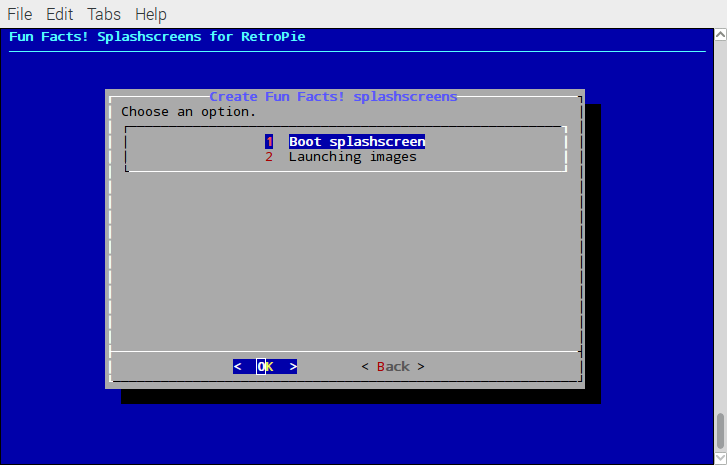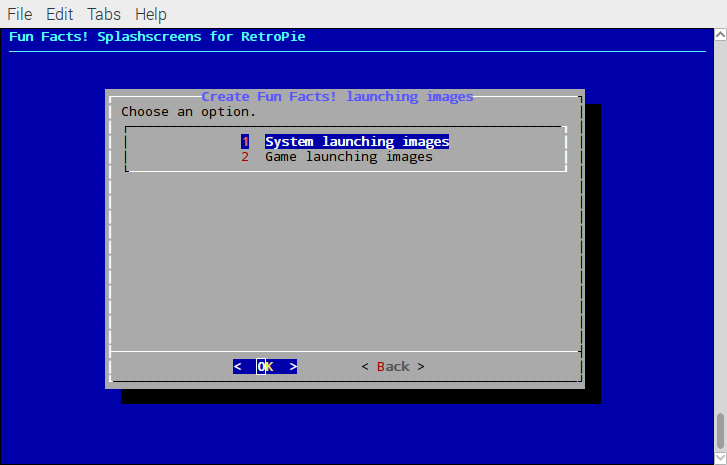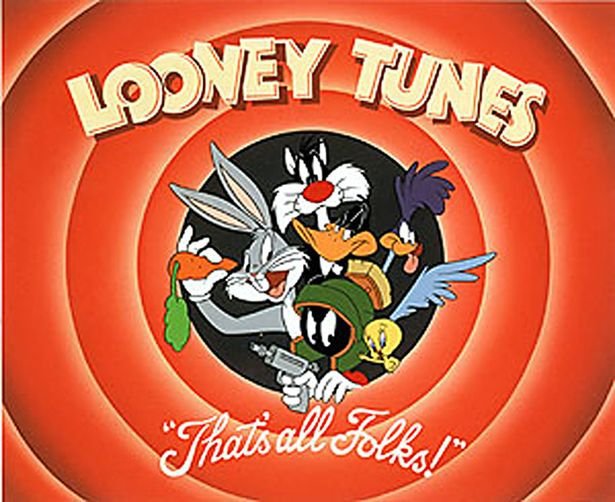shell scripting topic
-
@hiulit If it's not optional, just remove the brackets.
--create-fun-fact system [rom] -
@hiulit can you explain the use case and provide some examples?
I'm sure we can find ways to make an option have zero, one or two options, but from a user point of view I think it's a bit confusing.
EDIT:
I can't see what would be the use for--create-fun-fact system rom, but if it's intended to be used on RetroPie, you can detect the system by looking the directory where the rom is located. -
@meleu I'll try to explain myself even better than the last time :P Here we go!
This all comes from the
fun-facts-splashscreens-runcommand-onend.shthat has these lines:SYSTEM="$1" ROM_PATH="$3" sudo "$SCRIPT_DIR/fun-facts-splashscreens.sh" --create-fun-fact "$SYSTEM" "ROM_PATH"This is what creates the launching images when stoping the game. This is something the user doesn't need to care about. But then I already had
--create-fun-factin the help message so I wanted to let the user use it, like this:--create-fun-factwith no options passed creates a boot splashscreen.--create-fun-fact [SYSTEM](SYSTEM can beallor any RetroPie system) creates launching images for all the systems, or the given system with the system's logo (and console if it exists).--create-fun-fact [SYSTEM] [ROM](ROM can be an absolute path or just the ROM's name + ext, and then it takes the given system to look for the path) creates a launching image for the game.
Examples:
--create-fun-fact--create-fun-factall--create-fun-factmegadrive--create-fun-factmegadrive "/home/RetroPie/megadrive/Sonic the Hedgehog.zip"--create-fun-factmegadrive "Sonic the Hedgehog.zip"
I can see that from the user's perspective it could be a little confusing... Maybe it's better to split
--create-fun-factinto two separate functions--create-fun-fact-boot-splashscreenand--create-fun-fact-launching-images.Maybe I should remove this option from the help message? Just have it for myself to test?
That's something that can be done via the GUI, btw:

-
@hiulit You wouldn't want to create a launching image for Sonic using a NES splashscreen, would you? Well, my suggestion below does not have this kind of flexibility, but here it go:
help message
--create-fun-fact [system|path/to/a/ROM] no arguments = create boot splashscreen system = create a launching image for system ROM = create a launching image for a ROMIf you wanna use this approach, please write a better help message for this option! ;)
code
#!/bin/bash user="$SUDO_USER" [[ -z "$user" ]] && user="$(id -un)" home="$(eval echo ~$user)" readonly RP_DIR="$home/RetroPie" readonly RP_ROMS_DIR="$RP_DIR/roms" readonly RP_CONFIG_DIR="/opt/retropie/configs" function get_options() { case "$1" in #H --create-fun-fact [system|path/to/a/ROM] no arguments = create boot splashscreen #H system = create a launching image for system #H ROM = create a launching image for a ROM --create-fun-fact) if [[ -z "$2" ]]; then # NOTE: for this usecase the --create-fun-fact MUST be the # last parameter used in the command line. echo "Let's create a boot splashscreen with a fun fact!" elif [[ -f "$2" ]]; then # NOTE: if it's a regular file, let's check if it's a ROM and # create a splashscreen for this game. local rom_full_path="$(realpath "$2")" if [[ "$rom_full_path" != "$RP_ROMS_DIR"* ]]; then echo "ERROR: \"$2\" is not on a valid ROM directory" >&2 exit 1 fi # Reference for the tricks used to get the system's name below: # http://www.tldp.org/LDP/abs/html/parameter-substitution.html#PSOREX2 system="${rom_full_path#$RP_ROMS_DIR/}" system="${system%/*}" echo "Let's create a launching image for \"$2\" using the ${system}'s one!" elif [[ -d "$RP_CONFIG_DIR/$2" ]]; then echo "Let's create a launching image for \"$2\" system!" else echo "ERROR: \"$2\": invalid argument." >&2 exit 1 fi ;; #H --help Print the help message and exit. --help|-h) sed '/^#H /!d; s/^#H //' "$0" echo exit 0 ;; esac } get_options "$@"testing
$ ./cff.sh --create-fun-fact Let's create a boot splashscreen with a fun fact! $ ./cff.sh --create-fun-fact abcd ERROR: "abcd": invalid argument. $ ./cff.sh --create-fun-fact nes Let's create a launching image for "nes" system! $ ./cff.sh --create-fun-fact ~/RetroPie/roms/nes ERROR: "/home/meleu/RetroPie/roms/nes": invalid argument. $ ./cff.sh --create-fun-fact ~/RetroPie/roms/nes/Contra\ \(USA\).zip Let's create a launching image for "/home/meleu/RetroPie/roms/nes/Contra (USA).zip" using the nes's one! -
@meleu Thanks for your reply! And no, I wouldn't want that
launching image for Sonic using a NES splashscreen
But my script prevents from doing that.I'll try to paste every piece of code that I have, because it's very similar to what you have:
-cff|--create-fun-fact) is_fun_facts_empty if [[ -z "$2" ]]; then create_fun_fact else shift create_fun_fact "$@" shift fi ;;If no arguments are passed called
create_fun_factwithout arguments, if there are any arguments, pass them all.function create_fun_fact() { if [[ -z "$1" ]]; then create_fun_fact_boot else create_fun_fact_launching "$@" fi }There's more things going one here, but it basically calls one function or another depending on if there are arguments.
create_fun_fact_bootis self explanatory.
create_funfact_launchingtakes all the arguments and then:function create_fun_fact_launching() { local system="$1" local rom_path="$2" if [[ "$system" == "all" ]]; then // Loop all systems and call create_fun_fact_launching "$system" else if [[ -n "$rom_path" ]]; then // Check if $system it's the same in "rom_path" if true // Create launching image for the game else // Create launching image for the system else // Create launching image for the system fi fi }More or less that what I do. I think it's similar of what you wrote.
But then again, I think maybe it's better to to have 2 separate options:
--create-fun-facts-boot-splashscreen(doesn't accept any argument)--create-fun-facts-launching-images(accepts system and rom)
EDIT:
You can take a look for youself https://github.com/hiulit/RetroPie-Fun-Facts-Splashscreens/blob/new-gui-menu/fun-facts-splashscreens.sh ;) -
I've just found this and decided to share here:
The goal of this book is to document known and unknown methods of doing various tasks using only built-in
bashfeatures. Using the snippets from this bible can help remove unneeded dependencies from scripts and in most cases make them faster. -
@meleu Wow this is really helpfull ;) Cool snippets for bash coders. Thank you so much.
For ex:
Reverse array I didfor ((z=${#array[*]}-1; z>-1; z--)); do echo "${array[z]}" doneReverse array with the bash-bible
## Reverse an array # ```sh reverse_array() { # Usage: reverse_array "array" shopt -s extdebug f()(printf '%s\n' "${BASH_ARGV[@]}"); f "$@" shopt -u extdebug } # ```Up to now my version seems a bit less complex. Maybe it's due my limited coding skills. I'm still learning ....
-
@meleu I think that's just a note to me ... BashPitfalls
function1(){ local status=$(false) echo $? }Will return 0 which is obviously wrong
So the return code 0 just indicates the correct setting of a local setted value, which was correctly done ;)So to get out of this make following
function1(){ local status status=$(false) echo $? }This will put out correct value for "error" 1

-
@cyperghost yeah, that's a thing to be careful. I learned it while reading the RetroPie's Shell Style Guide: https://retropie.org.uk/docs/Shell-Style-Guide/#use-local-variables
-
I would like to share a little trick I learned today and also ask for some help...
First the short story
I was needing to check if the current hour is after 18h, then I tried this:
hour=$(date +%H) if [[ $hour -gt 18 ]]; then echo "do something..." fiAnd then I got this error (please, forgive the non-english):
-bash: [[: 08: valor muito grande para esta base de numeração (token de erro é "08")As you can see, the problem is that
date +%Hreturns08, and when I try to compare it, bash doesn't see08as a decimal number.The solution is obviously getting rid of that leading zero. I decided that using
sedwould be overkill for such a simple task, then I've found a pure bash solution using a feature of$(( )).hour=$(date +%H) hour=$(( 10#$hour )) # could also be an oneliner: $(( 10#$(date +%H) )) if [[ $hour -gt 18 ]]; then echo "do something..." fiAnd now my script is working perfectly!
Now the help I mentioned earlier on the beginning of this post...
On that stackoverflow answer I see this:
The
$(( ))sets up an arithmetic context and the10#converts the number from base 10 to base 10 causing any leading zeros to be dropped.Alright, but I like to see stuff on the official documentation in a hope to learn more tricks. The
$(( ))is a bash builtin feature, but in the official documentation there's no mention to the10#operand.Any thoughts on where to get info about it?
-
@meleu That I can answer !
Actually it's in the very doc you mention :
https://www.gnu.org/software/bash/manual/bash.html#Shell-ArithmeticConstants with a leading 0 are interpreted as octal numbers. A leading ‘0x’ or ‘0X’ denotes hexadecimal. Otherwise, numbers take the form [base#]n, where the optional base is a decimal number between 2 and 64 representing the arithmetic base, and n is a number in that base. If base# is omitted, then base 10 is used. When specifying n, the digits greater than 9 are represented by the lowercase letters, the uppercase letters, ‘@’, and ‘_’, in that order. If base is less than or equal to 36, lowercase and uppercase letters may be used interchangeably to represent numbers between 10 and 35.
-
@sano whoops! Didn't catch those little words 😅
Thanks Sano-san. And yeah, I learned more tricks!
-
@meleu Just FYI, you could just have used
date +%-H;)
Glad to see you here again BTW ! -
@sano ouch! Looks like I need RTFM some more...
From the
dateman page:By default, date pads numeric fields with zeroes. The following optional flags may follow '%': - (hyphen) do not pad the fieldThanks again, Sanso-sensei!
-
@meleu I really deserve no special credit for this, I just remembered something like this existed, probably had to use it in the past, too :)
-
A common mistake is often made by using
grep.
It is often told that grep finds a total of all search strings within a text file due the-cswitch. That is total nonsense .... -c just counts linesSo we miss
hello hello hello hello hello grep -c hello 2We use a small hack ;)
Better is to use the-ooption is will show occourences of search string listed in newline and now we pipe towc -l... and count lines again - now we catched them all ;)hello hello hello hello hello grep -o hello | wc -l 5 -
EDIT BEGIN
I think I found a good solution with pure bash
But maybe some knows a better one ;)val=${#Unix[@]} for ((i=0; i<$val; i+=1)); doEDIT END
Is there something that can be made easier (more efficient) than this script?
I want to merge two arrys
A1=(1 2 3)
A2=(one two there)
the result should be A3
A3=(1 one 2 two 3 three)It works with this script.
But first... I want to avoid any counters (if possible)
Do you know a nice trick to count up values{0..6}works only with fixed characters not as variable. So{0..6}is fine{0..$arraysize}not#!/bin/bash # A small script to show how to merge two arrays # with alternating values (exp. for creating arrays for dialogs) # Example Array Unix=("Debian" "Red hat" "Ubuntu" "Suse" "Fedora" "UTS" "OpenLinux") Shell=("bash" "csh" "jsh" "rsh" "ksh" "rc" "tcsh") # Check if both arrays got some size [[ ${#Unix[@]} -eq ${#Shell[@]} ]] || exit 1 echo "Both arrays got same size -- Proceed" val=$((${#Unix[@]}-1)) echo $val for i in $(seq 0 $val); do echo "Merging ${Unix[$i]} and ${Shell[$i]}" UnixShell+=("${Unix[$i]}" "${Shell[$i]}") done echo "${UnixShell[@]}" -
@cyperghost both methods are perfectly valid (using a for to iterate through all items).
-
@meleu thanks for the feedback -- I appreciate it ;)
Come on ... take a look in the MAME RoW now - if you have time ;) -
FYI, I'll release a new version of RetroPie Shell Script Boilerplate soon-ish.
This is a template for building shell scripts for RetroPie, with some helper functions, dialogs, etc.
Contributions to the project are always appreciated, so if you would like to support us with a donation you can do so here.
Hosting provided by Mythic-Beasts. See the Hosting Information page for more information.